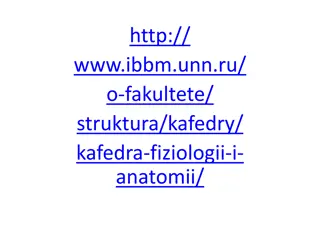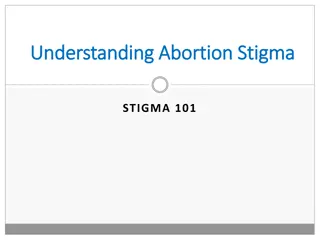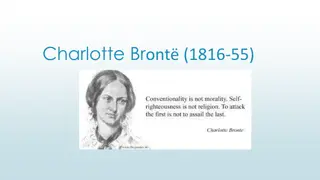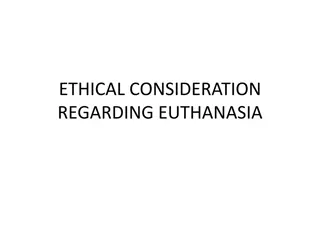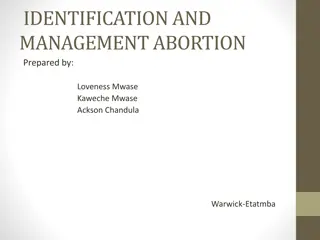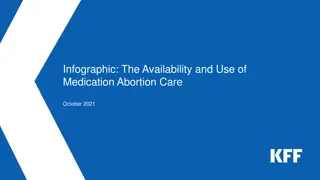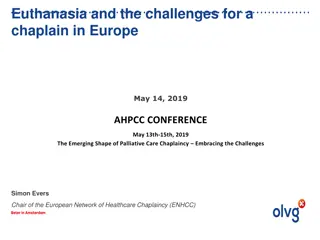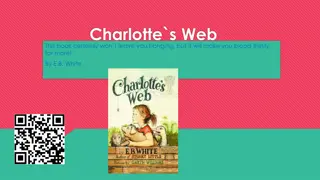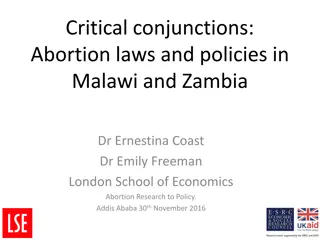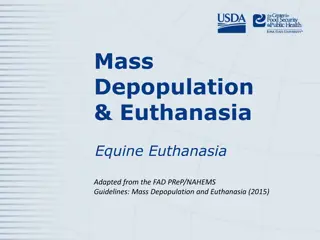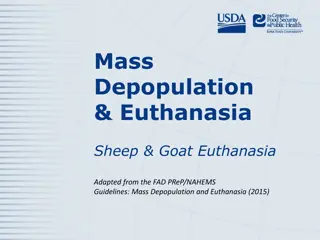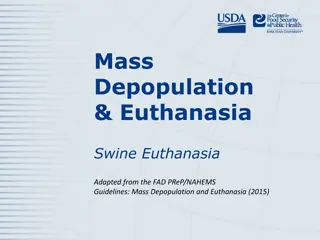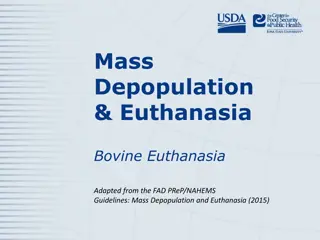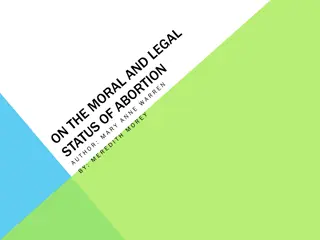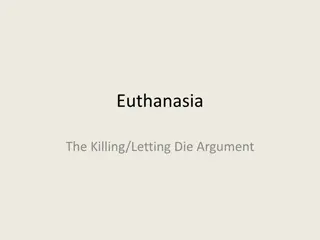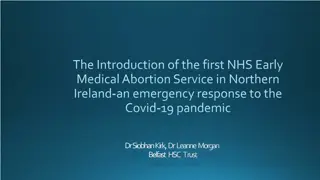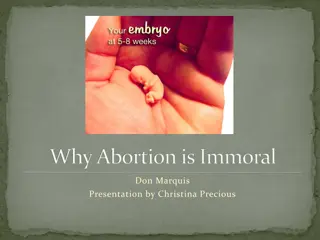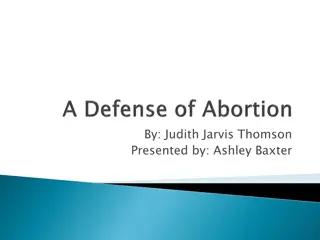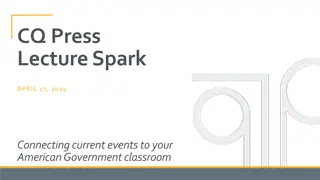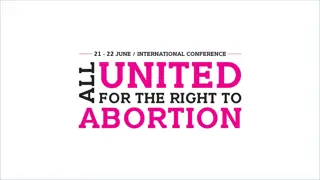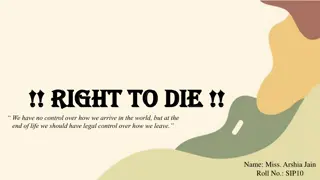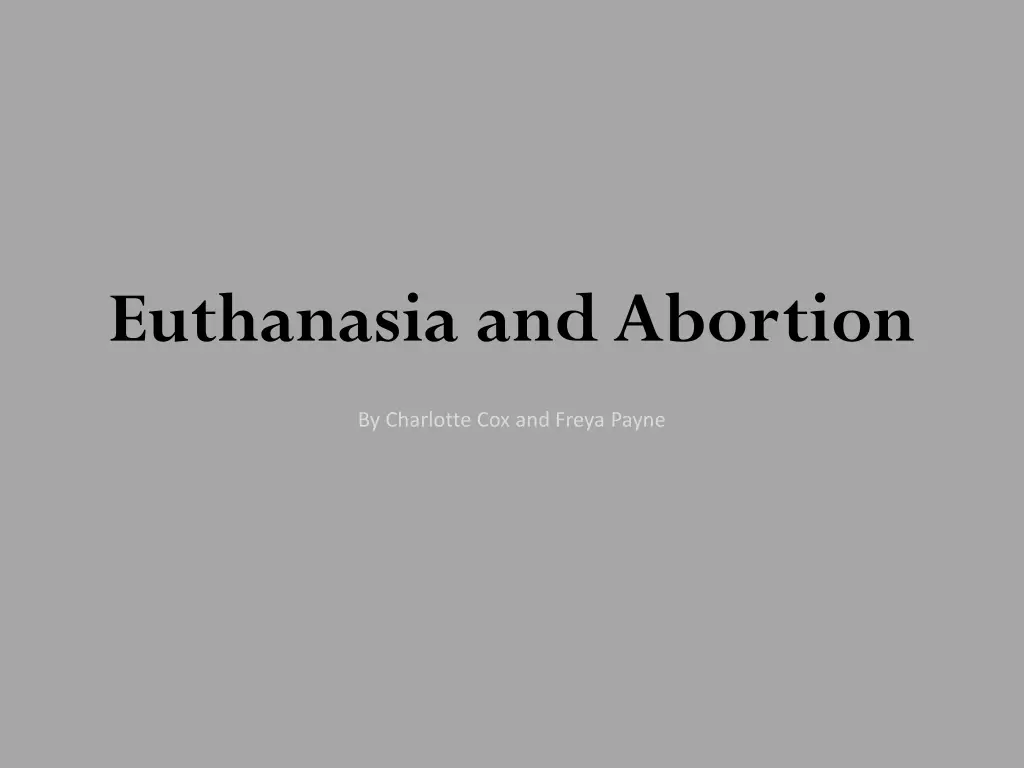
Abortion: Ethical Issues and Moral Dilemmas Analyzed
Explore the ethical complexities surrounding abortion, from debates on when a fetus becomes a person to the intersection of rights between the mother and the unborn. Dive into various ethical frameworks and real-life examples to understand the different perspectives on abortion and the moral implications involved.
Uploaded on | 1 Views
Download Presentation

Please find below an Image/Link to download the presentation.
The content on the website is provided AS IS for your information and personal use only. It may not be sold, licensed, or shared on other websites without obtaining consent from the author. If you encounter any issues during the download, it is possible that the publisher has removed the file from their server.
You are allowed to download the files provided on this website for personal or commercial use, subject to the condition that they are used lawfully. All files are the property of their respective owners.
The content on the website is provided AS IS for your information and personal use only. It may not be sold, licensed, or shared on other websites without obtaining consent from the author.
E N D
Presentation Transcript
Euthanasia and Abortion By Charlotte Cox and Freya Payne
Abortion The deliberate termination of a human pregnancy. It is an ethical issue because: It could be considered as the murder of an innocent person and as a legalised killing Some consider the foetus a person and a potential human being who has the right to life. It s debated whether the rights of the mother is more important than the rights of the foetus.
Ethical Questions At what point does a foetus become a human being and can no longer be aborted? Is the rights of the mother more important than the rights of the foetus? Who should decide if abortion is acceptable: the government, physicians or those immediately involved? To what extent does the father have rights in the decision making? Should under 16 s be able to have an abortion without parental consent? Is a foetus considered a person from the moment of conception or when it is born out of the womb? Does the woman have the right to decide if she should carry the baby to term or not? Should abortion be made an illegal practise?
Abortion and Situation Ethics Deciding what is right and wrong depending on the situation; each situation is unique and deserving of a unique solution. Real life example: If a woman is raped and becomes pregnant, it is seen as acceptable (by law) for the woman to have an abortion. However it is not acceptable for a woman to have an abortion if the reason is that she doesn t like the gender of the baby.
Abortion and Virtue Ethics When a right act is the action a virtuous (good) person would do in that situation. E.g. Doing the most loving or charitable act without thinking of the outcome. Real life example: Applying virtue ethics to abortion depends on the status of the foetus: does it have the rights of a person or not? If the foetus isn t a person then a virtuous person may terminate the pregnancy however if it does have the rights of a person then a virtuous person would try to prevent the abortion.
Abortion and Natural Moral Law According to Natural Moral Law, it is deemed unacceptable to have an abortion. This is because it goes against the primary precept of preservation of life which leads to the secondary precept do not abort . The Catholic church hold this to the absolute.
Real Life Example A Hindu woman living in Ireland (Catholic country) died after not being allowed an abortion by the law. She was experiencing severe back pain and had miscarried before; the abortion was refused because there was still a foetal heartbeat. Her devastated husband said she d still be alive if she had the abortion and it was unfair that she was disallowed it because of religious beliefs that she does not follow. Stephen Hone, 24, went to the High Courts to prevent his ex-girlfriend Claire Hansell, 31, from ending her pregnancy. Mr Hone said he would take care of the baby when it was born, but if Ms. Hansell had an abortion he would seek access to the unborn baby s remains to arrange a funeral. Ms. Hansell had an abortion in March 2001.
Opinion of a Philosopher J.J. Thompson even if the foetus is a person it may be morally justified. Her analogy is that imagine that you were knocked unconscious, hooked up to a famous violinist who must depend on you for life support for the coming nine months. Thomson argues that you would be morally justified to unhook yourself even if it resulted in the death of the violinist. By analogy, a woman can unhook herself from a foetus even if the foetus is a person. However the limitations of this analogy is that it only refers to a rape situation and also that the violinist is not someone who the person is related to or even knows.
Euthanasia The painless killing of a patient suffering from an incurable and painful disease or in an irreversible coma. It is an ethical issue because: Religious opponents of euthanasia believe that life is given by God, and only God should decide when to end it. Others believe we should be allowed to do what we want with our bodies, making someone live longer than they want violates our personal freedom.
Ethical Questions Do we have a legal or moral right to die ? Are some people more worthy of euthanasia than others? Is quality of live more important than sanctity of life? Who makes the decision of life and death? Is assisting someone is suicide playing God ? Does euthanasia go against doctors duty to keep people alive?
Real Life Example Danny Bond was born 12 weeks early In Southampton, England. It was the start of a lifelong battle with illness. When he was still in the special baby unit in the hospital, he developed an infection in his bowel lining. No one knew what the problem was until he was 11 years old. As a result of his illness, Bond never spent more than a few months outside of the hospital. He only celebrated two birthdays and two Christmases at home. During his 20 years, he endured over 300 surgeries and suffered almost every day. By the time he was 13, he started talking about wanting to die. He tried to commit suicide twice on his own, but his mother revived him each time. Once he was 21, Danny was getting sicker and was put in the hospital. This time, he decided that he wasn t going to leave. His life had just become too much. However, the only legal way for Bond to kill himself while in the hospital was to starve himself. Against the wishes of doctors, his mother and stepfather watched him die slowly over the course of days. Bond died at the age of 21 in July 2002.
Real Life Example Kevorkian earned the name 'Dr Death' by photographing the eyes of dying patients. Later in his career (starting in 1987) he began to advertise his services as a physician offering 'death counselling'. When terminally ill patients learned that he was helping people to die, more and more people came to him. Despite several failed court cases, Kevorkian helped over 130 people to die. Could this be seen as breaking the law for the right reasons or were his actions immoral?
Opinion of a Philosopher Immanuel Kant disagreed with making moral choices out of compassion and kindness (the road to hell is paved with good intentions), the only right thing to do is what reason dictates. He said taking your own life is a violation of natural law Joseph Fletcher argued that if a person is suffering from an incurable disease that is putting a person through a huge amount of pain and they request help to end their life and stop this suffering. He would say that the most loving thing to do is to allow the person to end their life. In this way you will end their suffering and are making them happy as you are allowing the to carry out their wishes this only applies if the circumstances are severe with no other possible outcome.
Natural Moral Law One of the primary precepts is to 'protect and preserve the innocent'. It is therefore a secondary precept and an absolute moral rule that you should never kill an innocent person. It would seem that euthanasia is always wrong even if the person is in incurable pain.

